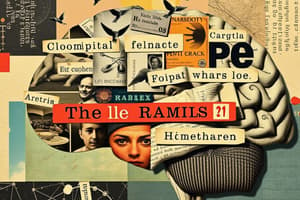Podcast
Questions and Answers
What is learning?
What is learning?
A relatively permanent change in an organism's behavior due to experience.
What is habituation?
What is habituation?
An organism's decreasing response to a stimulus with repeated exposure to it.
What is associative learning?
What is associative learning?
Learning that certain events occur together.
What is classical conditioning?
What is classical conditioning?
What is behaviorism?
What is behaviorism?
What is an unconditioned response (UR)?
What is an unconditioned response (UR)?
What is an unconditioned stimulus (US)?
What is an unconditioned stimulus (US)?
What is a conditioned response (CR)?
What is a conditioned response (CR)?
What is a conditioned stimulus (CS)?
What is a conditioned stimulus (CS)?
What is acquisition in classical conditioning?
What is acquisition in classical conditioning?
What is higher-order conditioning?
What is higher-order conditioning?
What is extinction?
What is extinction?
What is spontaneous recovery?
What is spontaneous recovery?
What is generalization?
What is generalization?
What is discrimination in classical conditioning?
What is discrimination in classical conditioning?
What is learned helplessness?
What is learned helplessness?
What is respondent behavior?
What is respondent behavior?
What is operant conditioning?
What is operant conditioning?
What is operant behavior?
What is operant behavior?
What is the law of effect?
What is the law of effect?
What is an operant chamber?
What is an operant chamber?
What is shaping?
What is shaping?
What is a discriminative stimulus?
What is a discriminative stimulus?
What is a reinforcer?
What is a reinforcer?
What is positive reinforcement?
What is positive reinforcement?
What is negative reinforcement?
What is negative reinforcement?
What is a primary reinforcer?
What is a primary reinforcer?
What is a conditioned reinforcer?
What is a conditioned reinforcer?
What is continuous reinforcement?
What is continuous reinforcement?
What is partial (intermittent) reinforcement?
What is partial (intermittent) reinforcement?
What is a fixed-ratio schedule?
What is a fixed-ratio schedule?
What is a variable-ratio schedule?
What is a variable-ratio schedule?
What is a fixed-interval schedule?
What is a fixed-interval schedule?
What is a variable-interval schedule?
What is a variable-interval schedule?
What is punishment?
What is punishment?
What is a cognitive map?
What is a cognitive map?
What is latent learning?
What is latent learning?
What is insight?
What is insight?
What is intrinsic motivation?
What is intrinsic motivation?
What is extrinsic motivation?
What is extrinsic motivation?
What is biofeedback?
What is biofeedback?
What is observational learning?
What is observational learning?
What is modeling?
What is modeling?
What are mirror neurons?
What are mirror neurons?
What is prosocial behavior?
What is prosocial behavior?
Flashcards are hidden until you start studying
Study Notes
Learning Concepts
- Learning is defined as a relatively permanent change in behavior resulting from experience.
- Habituation refers to the decreased response to a stimulus after repeated exposure.
- Associative learning involves linking certain events together, such as stimuli in classical conditioning or responses and consequences in operant conditioning.
Classical Conditioning
- Classical conditioning links two stimuli, allowing anticipation of events; an example is Pavlov's dogs.
- Unconditioned response (UR) is the natural reaction to an unconditioned stimulus (US), like salivation when food is present.
- Conditioned response (CR) is the learned reaction to a previously neutral conditioned stimulus (CS), which becomes associated with the US.
Conditioning Processes
- Acquisition is the initial stage of linking a neutral stimulus to an unconditioned stimulus.
- Higher-order conditioning occurs when a conditioned stimulus is paired with a new neutral stimulus, creating a second conditioned stimulus.
- Extinction happens when a conditioned response diminishes due to the absence of the unconditioned stimulus.
Response Recovery and Generalization
- Spontaneous recovery is the reappearance of an extinguished conditioned response after a pause.
- Generalization is the tendency to respond similarly to stimuli that resemble the conditioned stimulus.
- Discrimination is the ability to distinguish between the conditioned stimulus and other stimuli that don't signal an unconditioned stimulus.
Operant Conditioning
- Operant conditioning strengthens behavior through reinforcement and weakens it through punishment.
- Law of effect states that behaviors followed by favorable consequences are likely to be repeated, while those with unfavorable consequences are less likely to recur.
- Reinforcers strengthen the behavior they follow, with positive reinforcement increasing behaviors by presenting positive stimuli.
Reinforcement Schedules
- Continuous reinforcement involves reinforcing a response every time it occurs.
- Partial reinforcement results in slower acquisition of a response but greater resistance to extinction.
- Schedules include fixed-ratio, variable-ratio, fixed-interval, and variable-interval, each defining when and how often reinforcement occurs.
Learning Beyond Conditioning
- Learned helplessness describes a state where individuals resign after repeated failures to avoid adverse events.
- Cognitive maps are mental representations of environments, illustrated by rats navigating mazes.
- Latent learning is knowledge that isn't immediately apparent but can be demonstrated when there is motivation.
Motivation and Learning Methods
- Insight refers to a sudden realization of the solution to a problem.
- Intrinsic motivation drives individuals to perform behaviors for their own sake, while extrinsic motivation involves doing things for rewards or to avoid punishment.
- Observational learning is achieved by watching and imitating others, facilitated by modeling and mirror neurons in the brain.
Positive Behavior and Psychological Tools
- Prosocial behavior promotes positive, constructive actions, contrasting with antisocial behavior.
- Biofeedback systems provide physiological data for self-regulation, such as managing blood pressure or muscle tension.
Studying That Suits You
Use AI to generate personalized quizzes and flashcards to suit your learning preferences.




